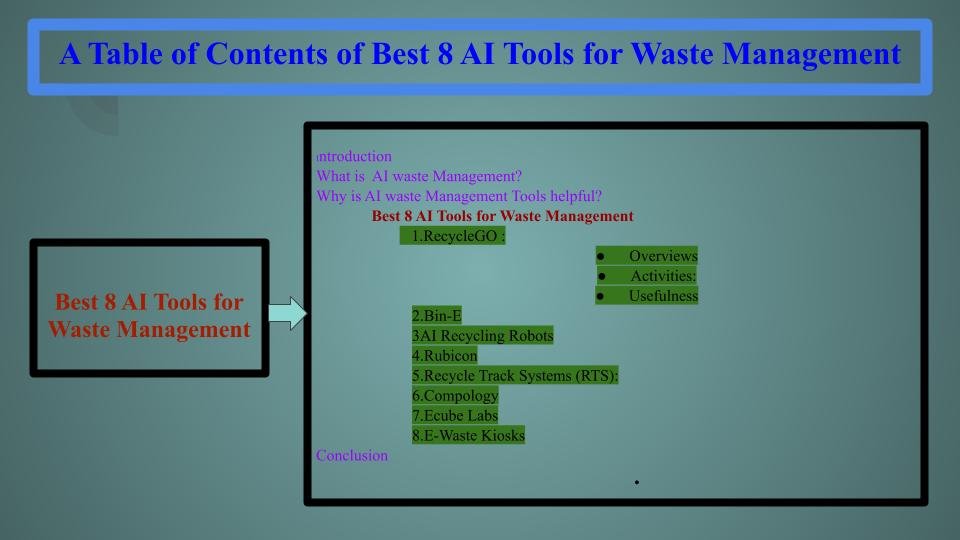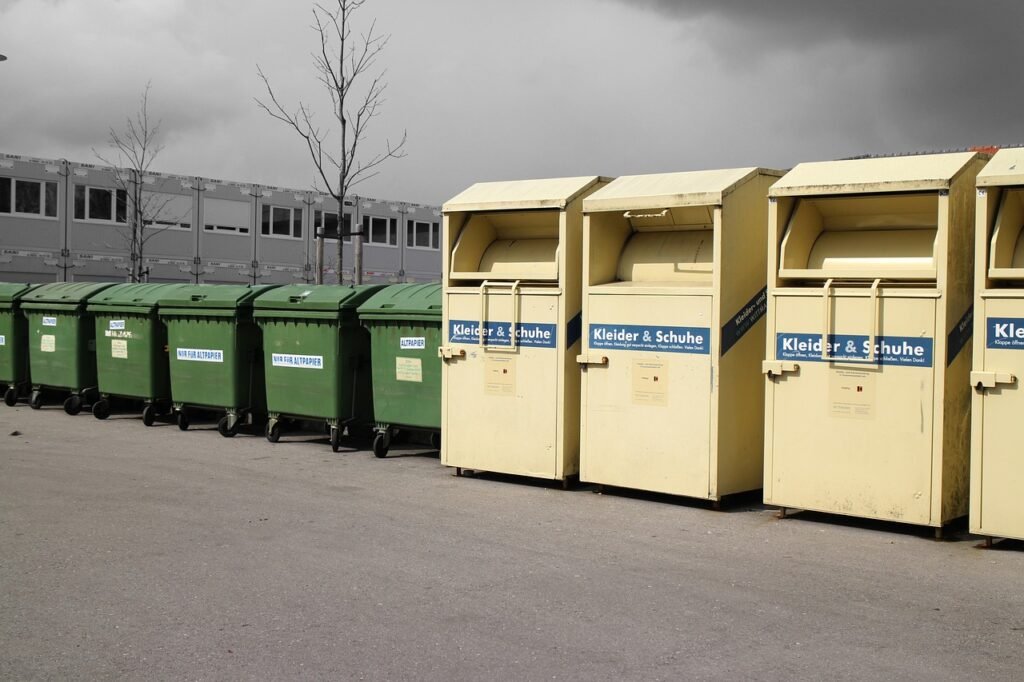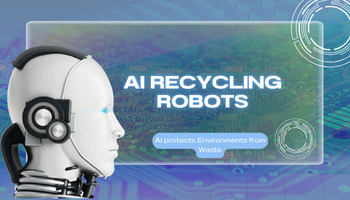Let us to know about best 8 AI Tools for Waste Management by briefly discussing on this blog post.

Waste management is a critical component of modern society, essential for maintaining public health, environmental quality, and overall sustainability. With the rapid growth of urbanization and industrialization, the volume of waste generated has increased significantly, posing substantial challenges for traditional waste management practices. These challenges include the effective collection, transportation, processing, and disposal of various types of waste, ranging from household garbage to hazardous industrial materials. Inefficient waste management can lead to severe environmental degradation, including soil, water, and air pollution, and contribute to climate change through the emission of greenhouse gases from decomposing waste in landfills(Best 8 AI tools for Waste Management).
In response to these pressing issues, innovative solutions are being developed, with artificial intelligence (AI) emerging as a transformative technology in the field of waste management. Best 8 AI Tools for Waste Management, leverages advanced algorithms, machine learning, and data analytics to optimize and automate various aspects of waste management processes. By integrating AI into waste management systems, it becomes possible to enhance efficiency, reduce costs, and minimize the environmental impact of waste disposal. This technological advancement promises to revolutionize how waste is handled, making it more sustainable and aligned with the goals of a circular economy, where waste is minimized, and resources are reused and recycled as much as possible.

What is AI Waste Management?
AI waste management refers to the application of artificial intelligence technologies to improve the efficiency, accuracy, and effectiveness of waste management processes. This includes using machine learning algorithms to predict waste generation patterns, optimize collection routes, and sort recyclable materials more accurately. AI can analyze large volumes of data from various sources, such as sensors on waste bins, GPS tracking of collection vehicles, and historical waste generation data, to provide actionable insights and automate decision-making processes. By enhancing the precision and responsiveness of waste management systems, AI helps to reduce operational costs, improve resource recovery rates, and minimize the environmental impact of waste disposal.
Why are AI Waste Management Tools Helpful?
Best 8 AI Tools for Waste Management is badly needed for green waste Management
Enhanced Efficiency: AI optimizes collection routes and schedules, reducing fuel consumption and operational costs.
Improved Sorting: Advanced algorithms can accurately identify and separate recyclable materials, increasing recycling rates.
Predictive Analytics: AI predicts waste generation patterns, enabling better planning and resource allocation.
Real-time Monitoring: Sensors and AI provide real-time data on waste levels, preventing overflows and ensuring timely collection.
Cost Reduction: Automation and optimization lead to significant cost savings in waste management operations.
Environmental Benefits: Efficient waste management reduces greenhouse gas emissions and minimizes pollution.
Enhanced Decision-Making: AI provides actionable insights for policymakers and waste management companies, improving strategic planning and execution.
Best 8 AI tools for Waste Management
1.RecycleGO

RecycleGO is one of the best 8 AI Tools for Waste Management, AI-powered platform that enhances recycling efficiency and transparency by integrating blockchain and machine learning. It connects waste generators, haulers, and recycling facilities, providing real-time data and analytics to optimize recycling operations and track materials. RecycleGO supports a circular economy by improving resource recovery and reducing environmental impact.
Overviews:
RecycleGO ,one of the best 8 AI Tools for Waste Management, an AI-powered platform designed to enhance the efficiency and transparency of recycling processes. By integrating advanced technologies such as blockchain and machine learning, RecycleGO connects stakeholders across the recycling supply chain, including waste generators, haulers, and recycling facilities. The platform provides real-time data and analytics, enabling users to optimize their recycling operations and track the flow of recyclable materials. RecycleGO aims to support a circular economy by improving resource recovery rates and reducing environmental impact, fostering a more sustainable approach to waste management.
Activities:
Data Collection: Gathering data from sensors and user inputs to monitor recycling processes.
Route Optimization: Using AI algorithms to determine the most efficient routes for waste collection.
Sorting Automation: Enhancing sorting processes with machine learning for better accuracy.
Predictive Analytics: Forecasting waste generation and recycling trends.
Real-time Monitoring: Providing continuous insights into recycling operations.
Blockchain Integration: Ensuring transparency and traceability in the recycling supply chain.
Usefulness:
RecycleGO enhances recycling efficiency, transparency, and sustainability. By connecting all stakeholders and providing real-time data, it optimizes resource recovery and reduces environmental impact. The integration of AI and blockchain technologies ensures accurate sorting and traceability, fostering a circular economy where materials are continually reused and recycled.
2.Bin-E

Bin-E is one of the best 8 AI Tools for Waste Management ,an intelligent waste bin that automates the sorting of waste using AI and IoT technologies. It identifies and separates different types of waste (plastic, paper, metal, and glass) with smart sensors and machine learning algorithms, compresses the waste to optimize space, and provides data analytics for tracking waste generation and recycling efficiency.
Overviews:
Bin-E is one of the best 8 AI Tools for Waste Management, an intelligent waste bin that automates the sorting of waste. Equipped with AI and IoT technologies, Bin-E identifies and separates different types of waste (plastic, paper, metal, and glass) using smart sensors and machine learning algorithms. The bin compresses the waste to optimize space and provides data analytics to track waste generation and recycling efficiency. By ensuring accurate sorting at the source, Bin-E helps reduce contamination in recycling streams and promotes better recycling practices, contributing to a more efficient and sustainable waste management system.
Activities:
Waste Identification: Using AI to recognize and classify waste types.
Automated Sorting: Sorting waste into appropriate categories automatically.
Compression: Compacting waste to maximize bin capacity.
Data Analytics: Tracking waste generation and recycling efficiency.
Real-time Monitoring: Providing updates on bin status and waste levels.
User Interaction: Offering a user-friendly interface for easy operation.
Usefulness:
Bin-E improves recycling accuracy and efficiency by automating waste sorting and providing valuable data on waste management. This reduces contamination and increases recycling rates, supporting a sustainable approach to waste management. Its compacting feature and real-time monitoring further optimize the waste handling process.
3.AI Recycling Robots

Rubicon utilizes AI and machine learning to provide waste management solutions for businesses and municipalities. The platform optimizes waste collection routes, monitors service quality, and tracks waste streams, offering data-driven insights to enhance sustainability efforts, reduce costs, and increase recycling rates through real-time tracking and management of waste operations.
Overviews:
AI Recycling Robots, one of the best 8 AI Tools for Waste Management ,developed by companies like AMP Robotics and ZenRobotics, use advanced machine learning algorithms and robotic systems to automate the sorting of recyclable materials. These robots can identify and separate various types of waste, such as plastics, metals, and paper, with high accuracy. The use of AI enables continuous learning and adaptation to different waste streams, improving sorting efficiency and reducing the need for manual labor. These robots significantly enhance recycling rates and the quality of recycled materials, making waste management processes more efficient and sustainable.
Activities:
Material Identification: Using AI to recognize and classify recyclables.
Automated Sorting: Separating materials accurately based on type.
Continuous Learning: Adapting to new waste streams and materials.
Operational Monitoring: Ensuring optimal performance of robotic systems.
Quality Control: Reducing contamination in sorted recyclables.
Data Analysis: Providing insights into sorting performance and efficiency.
Usefulness:
AI Recycling Robots improve the accuracy and efficiency of recycling operations, leading to higher recycling rates and better-quality recycled materials. Their ability to continuously learn and adapt makes them highly effective in various recycling environments, reducing the need for manual sorting and lowering operational costs.
4.Rubicon
Rubiconis one of the best 8 AI Tools for Waste Management utilizes AI and machine learning to provide waste management solutions for businesses and municipalities. The platform optimizes waste collection routes, monitors service quality, and tracks waste streams, offering data-driven insights to enhance sustainability efforts, reduce costs, and increase recycling rates through real-time tracking and management of waste operations.
Overviews:
Rubicon,one of the best 8 AI Tools for Waste Management, leverages AI and machine learning to provide comprehensive waste management solutions for businesses and municipalities. The platform optimizes waste collection routes, monitors service quality, and tracks waste streams to improve efficiency and reduce costs. By offering data-driven insights, Rubicon helps users enhance their sustainability efforts, reduce waste, and increase recycling rates. The cloud-based technology facilitates real-time tracking and management of waste operations, making it easier to implement effective waste management strategies and achieve environmental goals.
Activities:
Route Optimization: Using AI to plan efficient waste collection routes.
Service Monitoring: Tracking waste collection and management activities.
Data Analytics: Analyzing waste generation and collection data.
Sustainability Reporting: Providing insights for improving sustainability efforts.
Real-time Tracking: Monitoring waste operations continuously.
Resource Allocation: Optimizing the use of resources in waste management.
Usefulness:
Rubicon as the best 8 AI Tools for Waste Management , enhances waste management efficiency and sustainability by optimizing routes, monitoring services, and providing valuable data insights. This helps reduce operational costs, improve service quality, and increase recycling rates, supporting environmental goals and sustainable practices.
5.Recycle Track Systems (RTS)
Recycle Track Systems (RTS) is one of the best 8 AI Tools for Waste Management,uses AI and IoT technologies for intelligent waste management. The platform provides real-time tracking of waste activities, route optimization for collection trucks, and data analytics to monitor and improve operations. RTS connects waste generators with haulers and recycling facilities to ensure efficient and transparent waste handling.
Overviews:
Recycle Track Systems (RTS),one of the best 8 AI Tools for Waste Management, uses AI and IoT technologies to provide intelligent waste management solutions. The platform offers real-time tracking of waste and recycling activities, route optimization for collection trucks, and data analytics to monitor and improve waste management operations. RTS connects waste generators with haulers and recycling facilities, ensuring efficient and transparent waste handling. By optimizing collection schedules and providing actionable insights, RTS helps reduce operational costs, increase recycling rates, and promote sustainability in waste management practices.
Activities:
Real-time Tracking: Monitoring waste and recycling activities continuously.
Route Optimization: Planning efficient collection routes.
Data Analytics: Analyzing waste management data for insights.
Service Coordination: Connecting waste generators with haulers and recyclers.
Collection Scheduling: Optimizing schedules for waste collection.
Sustainability Reporting: Providing data-driven insights for sustainability efforts.
Usefulness:
RTS improves waste management efficiency and sustainability by optimizing routes, tracking activities in real-time, and providing valuable data insights. This helps reduce operational costs, increase recycling rates, and promote environmentally friendly waste management practices.
6.Compology
Compology is one of the best 8 AI Tools for Waste Management, employs AI-powered cameras and sensors to monitor waste and recycling containers, optimizing collection schedules and preventing overflow incidents. It provides real-time data on container fullness and contamination levels, significantly improving operational efficiency and sustainability by enabling better planning and resource allocation.
Overviews:
Compology ,one of the best 8 AI Tools for Waste Management, employs AI-powered cameras and sensors to monitor waste and recycling containers. This technology helps waste haulers and managers optimize collection schedules, prevent overflow incidents, and ensure proper sorting of recyclables. By providing real-time data on container fullness and contamination levels, Compology significantly improves operational efficiency and sustainability. The system’s AI-driven analytics enable better planning and resource allocation, helping waste management companies reduce costs and enhance service quality while promoting environmentally friendly practices.
Activities:
Container Monitoring: Using sensors and cameras to track waste levels.
Data Collection: Gathering data on container fullness and contamination.
Route Optimization: Planning efficient collection routes based on real-time data.
Overflow Prevention: Ensuring timely collection to prevent overflow incidents.
Sorting Verification: Monitoring proper sorting of recyclables.
Predictive Analytics: Forecasting waste generation and optimizing resource allocation.
Usefulness:
Compology enhances waste management efficiency by providing real-time data on waste levels and contamination. This enables better planning and resource allocation, reducing operational costs and improving service quality. The system’s predictive analytics support sustainability efforts by optimizing waste collection and recycling processes.
7.Ecube Labs
Ecube Labs is one of the best 8 AI Tools for Waste Management ,offers smart waste management solutions using AI and IoT technologies. Their products include solar-powered compacting bins, fill-level sensors, and waste analytics software. These tools monitor waste levels in real-time, optimize collection routes, and provide data-driven insights to enhance efficiency, reduce collection frequency, and support sustainability efforts.
Overviews:
Ecube Labs as the best 8 AI Tools for Waste Management offers smart waste management solutions using AI and IoT technologies. Their products include solar-powered compacting bins, fill-level sensors, and waste analytics software. These tools monitor waste levels in real-time, optimize collection routes, and provide data-driven insights to improve waste management efficiency. By reducing the frequency of collections and minimizing operational costs, Ecube Labs’ solutions help waste management companies enhance sustainability efforts and reduce environmental impact. The integration of AI ensures continuous improvement and adaptation to changing waste management needs.
Activities:
Real-time Monitoring: Using sensors to track waste levels in bins.
Compacting Waste: Solar-powered bins compact waste to maximize capacity.
Data Analytics: Analyzing waste data for operational insights.
Route Optimization: Planning efficient collection routes.
Collection Scheduling: Reducing the frequency of waste collections.
Sustainability Reporting: Providing data-driven insights for sustainability efforts.
Usefulness:
Ecube Labs,one of the best 8 AI Tools for Waste Management, improves waste management efficiency by optimizing collection routes and schedules based on real-time data. Their smart bins and analytics software reduce operational costs and enhance sustainability efforts, supporting environmentally friendly waste management practices and reducing the environmental impact.
8.E-Waste Kiosk
:E-Waste Kiosks, one of the best 8 AI Tools for Waste Management, powered by AI, automate the recycling of electronic waste. These kiosks use machine learning algorithms to identify and sort various types of e-waste, such as smartphones and batteries. By ensuring proper recycling and disposal, they reduce the environmental impact of e-waste and provide valuable data for tracking recycling rates and promoting sustainable practices.
Overviews:
E-Waste Kiosks, one of the best 8 AI Tools for Waste Management ,powered by AI, provide a convenient solution for recycling electronic waste. These kiosks use advanced machine learning algorithms to identify and sort different types of e-waste, such as smartphones, tablets, and batteries. By automating the assessment and categorization of e-waste, these kiosks ensure proper recycling and disposal, reducing the environmental impact of electronic waste. The data collected from these kiosks can be used to track recycling rates, monitor the lifecycle of electronic products, and promote sustainable e-waste management practices.
Activities:
E-Waste Identification: Using AI to recognize and classify e-waste items.
Automated Sorting: Sorting e-waste into appropriate categories automatically.
Data Collection: Gathering data on e-waste types and quantities.
Lifecycle Tracking: Monitoring the lifecycle of electronic products.
User Interaction: Providing a user-friendly interface for easy operation.
Sustainability Reporting: Offering insights into e-waste management and recycling
Conclusion:
Effective waste management is crucial for maintaining environmental sustainability and public health. The integration of AI technologies into waste management systems has significantly improved the efficiency, accuracy, and sustainability of these processes. Best 8 AI tools for waste Management , like RecycleGO, Bin-E, AI Recycling Robots, Rubicon, Recycle Track Systems (RTS), Compology, Ecube Labs, and E-Waste Kiosks exemplify how innovative solutions can address the complexities of waste management. These tools leverage AI for activities such as real-time monitoring, automated sorting, route optimization, predictive analytics, and blockchain integration, enhancing operational efficiency and reducing environmental impact.
By optimizing waste collection routes, improving recycling rates, and providing valuable data insights, AI tools help waste management companies reduce operational costs and enhance service quality. Moreover, these technologies support the transition towards a circular economy, where waste is minimized, and resources are continually reused and recycled. The continuous improvement and adaptation capabilities of AI ensure that waste management practices can evolve in response to changing demands and environmental challenges.
In conclusion, AI-driven waste management solutions are essential for creating a more sustainable and efficient waste management system. By embracing these technologies, societies can significantly reduce their environmental footprint, conserve natural resources, and promote a cleaner, healthier environment for future generations. The adoption of AI in waste management represents a significant step forward in achieving long-term sustainability goals.


